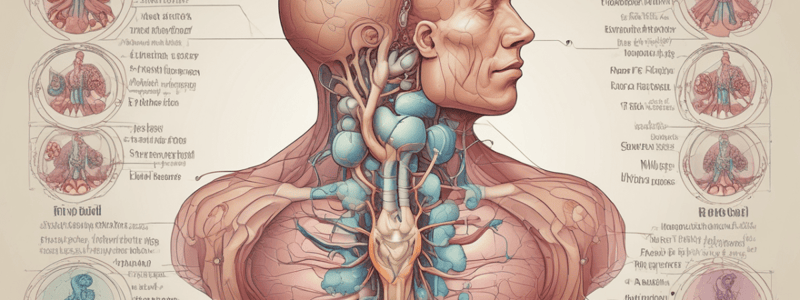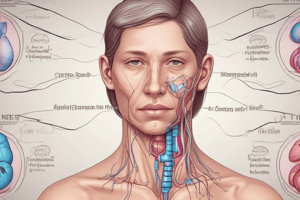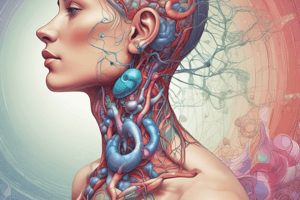Podcast
Questions and Answers
What is the effect of excessive water intake in cortisol deficiency?
What is the effect of excessive water intake in cortisol deficiency?
- It causes water deficiency in the body
- It leads to water retention in the body
- It leads to water poisoning (correct)
- It has no effect on the body
Which hormone is responsible for maintaining fluid and electrolyte balance in the body?
Which hormone is responsible for maintaining fluid and electrolyte balance in the body?
- Aldosterone (correct)
- Desoxycorticosterone
- Progesterone
- Estrogen
What is the result of insufficient secretion of aldosterone?
What is the result of insufficient secretion of aldosterone?
- Decreased blood volume and heart rate (correct)
- Increased sodium levels in the blood
- Increased blood pressure
- Increased potassium levels in the blood
What is the role of desoxycorticosterone?
What is the role of desoxycorticosterone?
What is the effect of excessive aldosterone secretion?
What is the effect of excessive aldosterone secretion?
Which hormone is responsible for the emergence of the gender instinct in women?
Which hormone is responsible for the emergence of the gender instinct in women?
What is the effect of aldosterone on the kidneys?
What is the effect of aldosterone on the kidneys?
What is the name of the condition where the thyroid gland continuously grows due to excessive stimulation by TSH?
What is the name of the condition where the thyroid gland continuously grows due to excessive stimulation by TSH?
What is the primary role of Calcitonin (CT)?
What is the primary role of Calcitonin (CT)?
What is the role of androgens in men?
What is the role of androgens in men?
Which of the following is NOT a consequence of Parathyroid Hormone (PTH) deficiency?
Which of the following is NOT a consequence of Parathyroid Hormone (PTH) deficiency?
What is the primary function of insulin in the body?
What is the primary function of insulin in the body?
What is the medical term for the condition where the blood glucose level falls below normal due to excessive insulin secretion?
What is the medical term for the condition where the blood glucose level falls below normal due to excessive insulin secretion?
Which of the following is NOT a characteristic of hyperglycemia?
Which of the following is NOT a characteristic of hyperglycemia?
Which gland is responsible for producing insulin and glucagon?
Which gland is responsible for producing insulin and glucagon?
What is the primary function of glucagon?
What is the primary function of glucagon?
What is the primary effect of angiotensin II on blood vessels?
What is the primary effect of angiotensin II on blood vessels?
What is the role of histamine in the inflammatory response?
What is the role of histamine in the inflammatory response?
What is the primary function of ACE inhibitors in the treatment of high blood pressure?
What is the primary function of ACE inhibitors in the treatment of high blood pressure?
Which of the following is NOT a direct consequence of a decrease in blood pressure to the glomeruli?
Which of the following is NOT a direct consequence of a decrease in blood pressure to the glomeruli?
What is the role of prostaglandins in the context of asthma?
What is the role of prostaglandins in the context of asthma?
What is the role of the kidneys in erythropoiesis?
What is the role of the kidneys in erythropoiesis?
What is the primary role of glucocorticoids?
What is the primary role of glucocorticoids?
Which hormones are released from the adrenal cortex?
Which hormones are released from the adrenal cortex?
What are the potential effects of glucocorticoid deficiency?
What are the potential effects of glucocorticoid deficiency?
Which part of the adrenal gland is responsible for releasing adrenaline?
Which part of the adrenal gland is responsible for releasing adrenaline?
Corticosteroid hormones are synthesized in which part of the adrenal gland?
Corticosteroid hormones are synthesized in which part of the adrenal gland?
What is a significant function of the hormone cortisol?
What is a significant function of the hormone cortisol?
What are the two main parts of the adrenal gland?
What are the two main parts of the adrenal gland?
Which of the following hormones is NOT produced by the adrenal cortex?
Which of the following hormones is NOT produced by the adrenal cortex?
Where is the thyroid gland located?
Where is the thyroid gland located?
Which hormone stimulates the regulation of thyroid hormones?
Which hormone stimulates the regulation of thyroid hormones?
What is the primary function of T3 and T4?
What is the primary function of T3 and T4?
Which of the following is NOT a function of thyroid hormones?
Which of the following is NOT a function of thyroid hormones?
What is the relationship between T3 and T4?
What is the relationship between T3 and T4?
How does thyroxine hormone affect glycogen?
How does thyroxine hormone affect glycogen?
Which of the following is NOT a characteristic of the thyroid gland?
Which of the following is NOT a characteristic of the thyroid gland?
What effect does thyroxine hormone have on the kidneys?
What effect does thyroxine hormone have on the kidneys?
Flashcards are hidden until you start studying
Study Notes
Thyroid Gland and Its Hormones
- The thyroid gland is the largest endocrine gland in the body, located in the lower anterior region of the neck, weighing around 25-30 grams.
- It consists of two lobes connected by the isthmus part.
- The thyroid gland produces hormones that regulate growth, development, and metabolic activities in the body.
Thyroid Hormones
- TSH (Thyroid-Stimulating Hormone) regulates the production of thyroid hormones.
- T3 (Tri-iodothyronine) and T4 (Thyroxine) are the two main thyroid hormones.
- T3 is more active and has a shorter half-life than T4.
- T4 is less active but more abundant and converts to T3 in the plasma.
- Thyroid hormones stimulate tissue metabolism, increase sympathetic activity, and regulate body temperature and growth.
Functions of Thyroid Hormones
- Provide normal growth and development by stimulating protein synthesis.
- Regulate metabolic activities, increasing oxygen consumption and carbon dioxide production.
- Increase respiratory rate and heart rate.
- Stimulate the oxidation of fatty acids in adipose tissue.
- Convert glycogen into glucose in the liver and prevent glycogen formation.
Parathyroid Hormones
- The parathyroid gland is located around the thyroid gland and produces parathormone.
- Parathormone stimulates bone resorption, increases plasma calcium levels, and prevents osteoporosis.
- Deficiency in parathormone can lead to hypocalcemia, tetany, and cramps.
Pancreas Hormones
- Insulin is produced by the Langerhans islets and regulates blood sugar levels.
- Insulin stimulates glucose storage in the liver, enables glucose use in cells, and decreases blood sugar.
- Deficiency in insulin leads to diabetes mellitus, characterized by high blood sugar levels, and can cause hyperglycemia.
- Glucagon, on the other hand, increases glucose release from the liver, increasing blood sugar levels.
Adrenal Cortex Hormones
- The adrenal cortex produces steroid hormones, including glucocorticoids, mineralocorticoids, and androgens.
- Glucocorticoids (e.g., cortisol and corticosterone) affect protein, fat, and carbohydrate metabolism, and have anti-inflammatory effects.
- Mineralocorticoids (e.g., aldosterone) maintain fluid and electrolyte balance, reabsorbing sodium and excreting potassium and hydrogen ions.
- Androgens (e.g., androcorticoids) play a role in sexual development and gender instinct.
Adrenal Medulla Hormones
- The adrenal medulla produces adrenaline (epinephrine) and noradrenaline (norepinephrine).
- Adrenaline increases heart rate, blood pressure, and energy levels, while noradrenaline has more specific effects on the heart and blood vessels.
Endocrine Function of the Kidney
- The kidney produces renin, which helps regulate blood pressure, and erythropoietin, which stimulates erythropoiesis.
- The kidney also synthesizes prostaglandins, which have a role in mediating asthma and chronic inflammation in the lung.
Studying That Suits You
Use AI to generate personalized quizzes and flashcards to suit your learning preferences.




